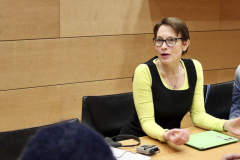Ketkä näissä vaaleissa pärjäsivät? Perussuomalaiset, vihreät ja vasemmistoliitto. Ja millaisilla arvoilla pärjättiin? Perussuomalaisten uhoavat sankarit huusivat tai puhuivat korostetun rauhallisesti videoilla, kadulla ja julisteissaan rajoja kiinni, ”omat ensin ja maassa maan tavalla tai maasta ulos”. He halveksuivat toisten huolta ilmastonmuutoksesta kutsumalla sitä ilmastovouhotukseksi. Ensimmäinen teema resonoi erityisesti keski-ikäisissä ärtyisissä miehissä ja nuorissa maaseudun pojissa ja toinen teema upposi moniin vanhempiin miehiin. Vihreiden ja vasemmiston akateemiset nuoret naiset ja kukkahattutädit (itseni mukaan lukien) saarnasivat ilmastonmuutosta ja köyhyyden torjuntaa sekä rahaa koulutukselle. Tämä näyttää kiinnostaneen erityisesti kaupunkien asukkaita ja luultavasti keskimääräistä enemmän akateemisia naisia kuin vähemmän koulutettuja miehiä. Nämä ryhmät – maaseudun pojat ja kaupunkien tytöt – ratkaisivat näiden vaalien voittajat.
Maltillisemmat isot puolueet jäivät politiikan uusilta supersankareilta oman vanhanaikaisuutensa jalkoihin etenkin keskusta ja demarit. Kokoomuksen näkyvät hahmotkaan eivät menestyneet edes rahan voimalla.
Neljät vaalit käyneenä voin sanoa, että nämä olivat merkillisimmät vaalit ikinä. Keskustan kojulla ei ole koskaan ollut niin autiota kuin näissä vaaleissa. Sen sijaan perussuomalaisten makkarat ja hernekeitto upposi köyhään vaiennettuun kansaan, joka kärsivällisesti jonotti osuuttaan kuin leipäjonoissa konsanaan. Siinä samalla ketsupin kanssa upposi suuhun myös palanen kitkeryyttä ja katkeruutta ilmastovouhottajia ja kaiken maailman ”matujen hyysääjiä” kohtaan. Oma olo tuntui niin vahvalta, kun saattoi kerrankin kuulua osaksi jotakin suurempaa sankaritarinaa, jossa vihollisena on ”suuri tuntematon” – turvapaikanhakijat tai ilmastonmuutosvouhotus. Maahanmuuttovastaisuus tuli esille leppoisien kaljapoikien kommentissa röyhtäyksen säestämänä eräässä pikkukaupungissa: ”ne vievät kaikki meidän naiset” ja kossien huutelussa Pudasjärven S-marketilla: ”me ollaan persuja”.
Voi pojat. Keskustalla olisi ollut tuhannen taalan paikka onnistua lempilapsissaan aluepolitiikassa ja maaseutupolitiikassa, mutta kaikki mureni isorikas Bernerin taksilakeihin ja lomarahojen vientiin tavalliselta kansalta. Maaseudun nuoriin iskivät erityisesti ammatillisen koulutuksen heikennykset. Ja veikkaan, että väkevämmän alkoholin tulo ruokakauppoihin ja hinnan halpeneminen on kurjistanut ihmisten elämää. Sen verran huonokuntoista väkeä tuli pikkupaikkakunnilla vastaan.
Nyt jos koskaan on aika kertoa ja osoittaa pikkukaupunkien ja kylien nuorille, että elämää on muutakin kuin mopoilla pärtsäily marketin pihalla. Pian aloittelevan hallituksen on syytä tehdä kunnon maaseutupoliittinen ohjelma, jolla luodaan näköaloja, koulutusmahdollisuuksia ja työpaikkoja harvaan asuttujen seutujen ihmisille. Siikalatvan kunta on tehnyt viisaan päätöksen tarjota maksuton lukio kuntansa nuorille. Tämä on houkutellut nuoret jäämään omaan lukioon ja omalle paikkakunnalle. Tämä on viisasta aluepolitiikkaa.
Nyt jos koskaan olisi syytä lisätä yhteiskunnan ja yleensäkin maailmanpolitiikan tuntemusta erityisesti nuorten keskuudessa, sillä äänestämällä puoluetta keisarin vaatteissa, joka tarjoaa isoihin yhteiskunnallisiin ongelmiin ratkaisuksi rajojen kiinni laittamista tai joka ummistaa silmänsä ilmaston lämpenemiseltä ei suoraan sanoen paranneta nuorten omaa tulevaisuutta. Nämä vaalit olivatkin melkoiset ihmisten sumutusvaalit ainakin perussuomalaisten taholta, sillä heillä ei ole ainakaan tällä hetkellä tarjottavana mitään toimivaa ratkaisua työllisyyden lisäämiseksi, koulutuksen laadun parantamiseksi tai vanhusten hoidon turvaamiseksi. Mutta ehkä sieltä niitä ratkaisuja alkaa löytyä, kun huomataan, ettei rajojen sulkeminen parilta tuhannelta turvapaikanhakijalta – joka ei muuten ole edes mahdollista – ratkaise Suomen ongelmia ja kun on vain pakko alkaa hillitä ilmaston lämpenemistä. Mutta luulen, että ratkaisuja ei löydy, vaan he luottavat siihen, että valta säilyy, kun mekastusta jatketaan suuren salin tuoleilta. Se on sinänsä harmi, sillä Jussi Halla-ahon aivokapasiteetilla olisi kyllä käyttöä valtion talouden tasapainottamisessa ja vaikkapa koulutuksen laadun parantamisessa.
Näissä vaaleissa menestyivät siis perussuomalaiset, vihreät ja vasemmistoliitto, sillä näillä puolueilla on tarjota äänekkäitä ja kauniita supersankareita, jotka erottuvat tylsästä massasta. Kukapa haluaisi enää Tapani Töllin kaltaisia viisaita päättäjiä, joilla on malttia pohtia sivistyneesti asioita eri kantilta, kun tarjolla on somessa mesoavia ja vihaa lietsovia vihaista poliitikkoa näytteleviä hahmoja, joita ei kirjat tai maaseudun elinvoima liiemmin kiinnosta. Supersankareihin lukeutuu myös pikku Greta, joka istuu perjantait ilmastolakossa ja jolla on miljoonia seuraajia ympäri maailmaa. Hän saa vastakaikua ympäristöstä huolissaan olevissa ihmisissä, jotka antavat äänensä todennäköisesti vihreille tai vasemmistolle. Ketä yleensä kiinnostaa enää perinteinen politiikka, kun kentillä liikkuu vaikka minkälaista narria ihmisiä viihdyttämässä? Joku Tuomioja, Tölli, Haavisto tai Jaakonsaariko? EVVK.
Ja sitten on se joukko, joka valvoo yöt ja nukkuu päivät. Tämä on uusi joukko ihmisiä, joita en ole aiemmin tavannut. He ovat huppupäistä kansaa, jota ei edes politiikan superhahmot jaksa enää kiinnostaa, jos on koskaan kiinnostanutkaan. He liikkuvat hiljaa, vaivihkaa silmissä pistemäiset pupillit. Luulen, että tämä on sitä nukkuvaa neljännestä, jota ei enää valtamedia tavoita, jos yleensäkään mikään media hashiskanavia lukuun ottamatta. Jos jostain, niin tästä väestä olen päättäjänä erityisen huolissani, jopa enemmän huolissani kuin mopopojista ABC:n peliautomaateilla. Sillä heidän syrjäytymisensä on alkanut todennäköisesti jo äidin kohdussa. Jos nämä nuoret halutaan ”pelastaa” ns. ”normielämään” täytyy varhaisen puuttumisen alkaa jo todella varhain, jo siinä vaiheessa, kun heidän äitinsä on vielä koulunpenkillä tai luisumassa pois yhteiskunnan ulottumattomiin. Tällaista väkeä en ole tavannut ennen, ja nämä olivat minulle sentään jo neljännet eduskuntavaalit.
Olen iloinen kuitenkin siitä, että joitakin huolettaa vielä perinteisetkin politiikan kysymykset kuten koulutus, ympäristönsuojelu, maanviljelijät – vai huolettaako? – eläkkeiden indeksit sekä vanhusten hoiva. Yksinhuoltajista ei näissä vaaleissa paljoa puhuttu eikä eläinten oikeuksista. Toivon, että jotakin myös nämä teemat kiinnostavat.
Vaalit ovat mielenkiintoista aikaa, sillä vaalipiiriä kiertäessä, vaalipaneeleissa ja vaalikojulla viikkojen ajan päivystäessä saa ajantasaisen katsauksen yhteiskunnan tilasta ja maailman menosta. Ihmisten kohtaaminen ja elämäntarinoiden ja kohtaloiden kuunteleminen on mielenkiintoista, opettavaista ja monesti koskettavaakin. Toisen ihmisen kanssa ajatusten vaihtaminen ja jakaminen muutaman minuutinkin ajan on aina yhtä hieno kokemus ja joskus keskustelu kevätviimassa saattaa venyä kymmeniksikin minuuteiksi.
Toivotan kaikille Oulun vaalipiirin edustajille voimia ja halua tehdä tästä maasta parempi kaikille sen asukkaille. Toivon, että vihan ilmapiiri liukenee yhteistyöhön ja haluun viedä Suomea sivistyneempään ja hyvinvoivampaan suuntaan.







